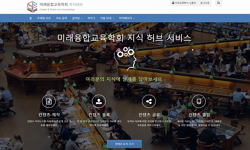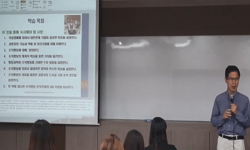The purpose of this study is to investigate whether the perceived ability of HRD to create a learning culture has actual influences on employees’ knowledge sharing by enhancing supervisors’ and peers’ commitment to learning. A questionnaire was ...
http://chineseinput.net/에서 pinyin(병음)방식으로 중국어를 변환할 수 있습니다.
변환된 중국어를 복사하여 사용하시면 됩니다.
- 中文 을 입력하시려면 zhongwen을 입력하시고 space를누르시면됩니다.
- 北京 을 입력하시려면 beijing을 입력하시고 space를 누르시면 됩니다.

The Influences of Perceived Ability of HRD to Create a Learning Culture on Supervisors' and Peers' Commitment to Learning and Knowledge Sharing
한글로보기https://www.riss.kr/link?id=A105989459
- 저자
- 발행기관
- 학술지명
- 권호사항
-
발행연도
2018
-
작성언어
English
- 주제어
-
등재정보
KCI등재
-
자료형태
학술저널
-
수록면
155-179(25쪽)
-
KCI 피인용횟수
1
- DOI식별코드
- 제공처
- 소장기관
-
0
상세조회 -
0
다운로드
부가정보
다국어 초록 (Multilingual Abstract)
The purpose of this study is to investigate whether the perceived ability of HRD to create a learning culture has actual influences on employees’ knowledge sharing by enhancing supervisors’ and peers’ commitment to learning. A questionnaire was distributed to organizational members from seven subsidiaries of a Korean motor company. Structural equation modeling was used to analyze the data collected from 587 participants, and the findings are as follows: First, supervisors’ and peers’ commitment to learning mediated the relationship between perceived ability of HRD to create a learning culture and knowledge sharing. Second, perceived ability of HRD to create a learning culture also had a direct positive effect on knowledge sharing. Finally, supervisors' commitment to learning had an indirect positive effect on knowledge sharing via enhancement of peers' commitment to learning. This study presents empirical evidences for the effects of the ability of HRD to create learning culture on knowledge sharing. Finally, details on the central role of HRD in creating a learning culture is discussed.
참고문헌 (Reference)
1 장용선, "조직문화 유형이 지식공유에 미치는 영향 분석" 대한경영학회 23 (23): 2793-2813, 2010
2 박종선, "인적자본기업패널 자료를 활용한 한국 기업의 조직성과와 고성과작업시스템, 무형식학습 활용도의 관계" 한국농·산업교육학회 47 (47): 73-98, 2015
3 최용범, "기업의 전략적 인적자원개발 업무 수행에 있어서의 조직적 전략과 최고경영자 리더십의 영향력 분석" 한국평생교육ㆍHRD연구소 4 (4): 91-107, 2008
4 Chiu, C. M., "Understanding knowledge sharing in virtual communities : An integration of social capital and social cognitive theories" 42 (42): 1872-1888, 2006
5 McCracken, M., "Towards a redefinition of strategic HRD" 24 (24): 281-290, 2000
6 Torraco, R. J., "The strategic roles of human resource development" 18 (18): 10-21, 1995
7 Eijikmanm, H., "The learning organization as concept and journal in the neo-millennial era" 18 (18): 164-174, 2011
8 Senge, P., "The fifth discipline: The art and practice of the learning organization" Bantam Doubleday Dell Publishing Group 1990
9 Song, J. H., "The effect of learning organization culture on the relationship between interpersonal trust and organizational commitment" 20 (20): 147-167, 2009
10 Anderson, J. C., "Structural equation modeling in practice: A review and recommended two-step approach" 103 : 411-423, 1988
1 장용선, "조직문화 유형이 지식공유에 미치는 영향 분석" 대한경영학회 23 (23): 2793-2813, 2010
2 박종선, "인적자본기업패널 자료를 활용한 한국 기업의 조직성과와 고성과작업시스템, 무형식학습 활용도의 관계" 한국농·산업교육학회 47 (47): 73-98, 2015
3 최용범, "기업의 전략적 인적자원개발 업무 수행에 있어서의 조직적 전략과 최고경영자 리더십의 영향력 분석" 한국평생교육ㆍHRD연구소 4 (4): 91-107, 2008
4 Chiu, C. M., "Understanding knowledge sharing in virtual communities : An integration of social capital and social cognitive theories" 42 (42): 1872-1888, 2006
5 McCracken, M., "Towards a redefinition of strategic HRD" 24 (24): 281-290, 2000
6 Torraco, R. J., "The strategic roles of human resource development" 18 (18): 10-21, 1995
7 Eijikmanm, H., "The learning organization as concept and journal in the neo-millennial era" 18 (18): 164-174, 2011
8 Senge, P., "The fifth discipline: The art and practice of the learning organization" Bantam Doubleday Dell Publishing Group 1990
9 Song, J. H., "The effect of learning organization culture on the relationship between interpersonal trust and organizational commitment" 20 (20): 147-167, 2009
10 Anderson, J. C., "Structural equation modeling in practice: A review and recommended two-step approach" 103 : 411-423, 1988
11 Yoon, S. W., "Structural determinants of team performance : The mutual influences of learning culture, creativity, and knowledge" 13 : 249-264, 2010
12 Gilley, J. W., "Strategically integrated HRD: Six transformational roles in creating results-driven programs" Perseus Books Group 2002
13 Garavan, T. N., "Strategic human resource development" 15 (15): 17-30, 1991
14 Mike Pedler, "Regenerating the learning organisation: towards an alternative paradigm" Emerald 26 (26): 97-112, 2019
15 Hayes, A. F., "Process: A versatile computational tool for observed variable mediation, moderation, and conditional process modeling"
16 Sorakraikitikul, M., "Organizational learning culture and workplace spirituality: Is knowledge-sharing behavior a missing link?" 21 (21): 175-192, 2014
17 Huber, G. P., "Organizational learning : The contributing processes and the literatures" 2 (2): 88-115, 1991
18 Ellinger, A. D., "Making the business case for the learning organization concept" 5 (5): 163-172, 2003
19 Ipe, M., "Knowledge sharing in organizations : A conceptual framework" 2 (2): 337-359, 2003
20 Van den Hooff, B., "Knowledge sharing in context : the influence of organizational commitment, communication climate and CMC use on knowledge sharing" 8 (8): 117-130, 2004
21 Wang, S., "Knowledge sharing : A review and directions for future research" 20 (20): 115-131, 2010
22 Gourlay, S., "Knowledge management and HRD" 4 (4): 27-46, 2001
23 Froehlich, D., "Informal workplace learning in Austrian banks : The influence of learning approach, leadership style, and organizational learning culture on managers' learning outcomes" 25 (25): 29-57, 2014
24 Watkins, K. E., "In action: Creating the learning organization" American Society for Training and Development 1996
25 Liao, L. F., "Impact of manager's social power on R&D employees' knowledge-sharing behaviour" 41 (41): 169-182, 2008
26 Conley, C. A., "Factors critical to knowledge management success" 11 (11): 334-348, 2009
27 Yamnill, S., "Factors affecting transfer of training in Thailand" 16 (16): 323-344, 2005
28 Blau, P. M., "Exchange and power in social life" Transaction Publishers 1964
29 Srivastava, A., "Empowering leadership in management teams : Effects on knowledge sharing, efficacy, and performance" 49 (49): 1239-1251, 2006
30 Durham, C. C., "Effects of interdependence on motivation, inter-team interaction processes, and performance" University of Maryland 1997
31 Watkins, K. E., "Dimensions of the learning organization questionnaire" Partners for the Learning Organization 1997
32 De Long, D. W., "Diagnosing cultural barriers to knowledge management" 14 (14): 113-127, 2000
33 Cabrera, A., "Determinants of individual engagement in knowledge sharing" 17 (17): 245-264, 2006
34 Hofstede, G., "Cultures and organizations: Software of the mind" McGraw-Hill 2010
35 Dyer, J. H., "Creating and managing a high-performance knowledge-sharing network: The Toyota case" 21 (21): 345-367, 2000
36 Faraj, S., "Coordinating expertise in software development teams" 46 (46): 1554-1568, 2000
37 Ellinger, A. D., "Contextual factors influencing informal learning in a workplace setting : The case of"reinventing itself company"" 16 (16): 389-415, 2005
38 Podsakoff, P. M., "Common method biases in behavioral research : A critical review of the literature and recommended remedies" 88 (88): 879-903, 2003
39 Weiss, L. M., "Collection and connection: The anatomy of knowledge sharing in professional service firms" Academy of Management 1999 (1999): A1-A6, 1999
40 Joo, B., "Career satisfaction, organizational commitment, and turnover intention : The effects of goal orientation, organizational learning culture, and developmental feedback" 31 : 482-500, 2010
41 Marquardt, M. J., "Building the learning organization: A systems approach to quantum improvement and global success" McGraw-Hill 1996
42 Garavan, T. N., "Building a learning organization" 71 (71): 1-14, 1993
43 Bock, G. W., "Behavioral intention formation in knowledge sharing : Examining the roles of extrinsic motivators, social-psychological forces, and organizational climate" 29 (29): 87-111, 2005
44 Ledermann, T., "Assessing mediation in dyadic data using the actor-partner interdependence model" 18 (18): 595-612, 2011
45 Tracey, J. B., "Applying trained skills on the job : The importance of the work environment" 80 (80): 239-252, 1995
46 Zboralski, K., "Antecedents of knowledge sharing in communities of practice" 13 (13): 90-101, 2009
47 Salim, M., "Antecedents of knowledge sharing attitude and intentions" 56 (56): 44-50, 2011
48 Yang, J. T., "Antecedents and consequences of knowledge sharing in international tourist hotels" 29 (29): 42-52, 2010
49 Ajzen, I., "Action control: From cognition to behavior" Springer-Verlag 11-39, 1985
50 Asrar-ul-Haq, M., "A systematic review of knowledge management and knowledge sharing: Trends, issues, and challenges" 3 (3): 1-17, 2016
51 Garavan, T. N., "A strategic perspective on human resource development" 9 (9): 11-30, 2007
52 Kulkarni, U. R., "A knowledge management success model : Theoretical development and empirical validation" 23 (23): 309-347, 2006
동일학술지(권/호) 다른 논문
-
Prediction of College Students’ Career Adaptability
- 중앙대학교 한국인적자원개발전략연구소
- 하선영
- 2018
- KCI등재
-
- 중앙대학교 한국인적자원개발전략연구소
- 강현주
- 2018
- KCI등재
-
- 중앙대학교 한국인적자원개발전략연구소
- 김화연
- 2018
- KCI등재
-
- 중앙대학교 한국인적자원개발전략연구소
- 이명숙
- 2018
- KCI등재
분석정보
인용정보 인용지수 설명보기
학술지 이력
| 연월일 | 이력구분 | 이력상세 | 등재구분 |
|---|---|---|---|
| 2027 | 평가예정 | 재인증평가 신청대상 (재인증) | |
| 2022-06-10 | 학회명변경 | 한글명 : 한국인적자원개발전략연구소 -> Human Engagement Institute영문명 : Korean Human Resource Development Strategy Institute -> Human Engagement Institute |  |
| 2021-01-01 | 평가 | 등재학술지 유지 (재인증) |  |
| 2018-05-01 | 학술지명변경 | 외국어명 : Journal of Competency Development & Learning -> Journal of Competency Development & Learning |  |
| 2018-01-01 | 평가 | 등재학술지 유지 (등재유지) |  |
| 2017-12-27 | 학술지명변경 | 한글명 : 한국HRD연구 -> 역량개발학습연구(구 한국HRD연구)외국어명 : Journal of Competency Development & Learning -> Journal of Competency Development & Learning |  |
| 2017-10-11 | 학술지명변경 | 외국어명 : Journal of Korean HRD Research -> Journal of Competency Development & Learning |  |
| 2015-01-01 | 평가 | 등재학술지 선정 (계속평가) |  |
| 2013-01-01 | 평가 | 등재후보 1차 FAIL (등재후보1차) |  |
| 2012-01-01 | 평가 | 등재후보학술지 유지 (기타) |  |
| 2011-01-01 | 평가 | 등재후보학술지 유지 (등재후보1차) |  |
| 2009-01-01 | 평가 | 등재후보학술지 선정 (신규평가) |  |
학술지 인용정보
| 기준연도 | WOS-KCI 통합IF(2년) | KCIF(2년) | KCIF(3년) |
|---|---|---|---|
| 2016 | 1.25 | 1.25 | 1.3 |
| KCIF(4년) | KCIF(5년) | 중심성지수(3년) | 즉시성지수 |
| 1.31 | 1.41 | 1.956 | 0.13 |





 KCI
KCI




